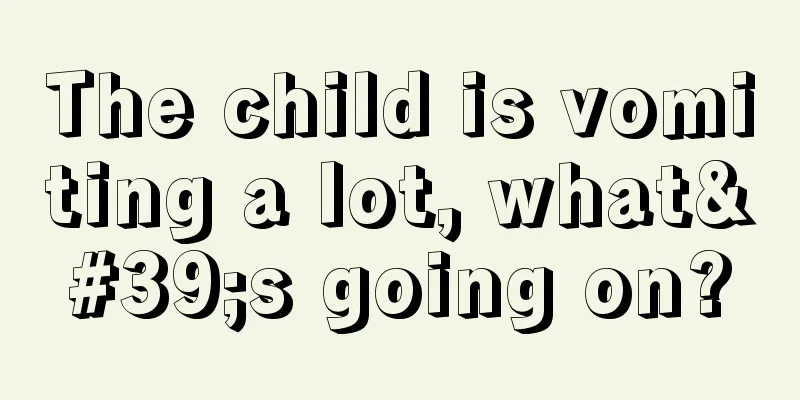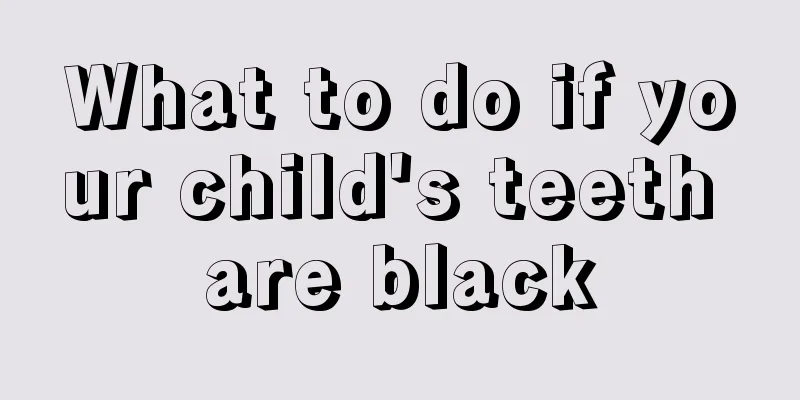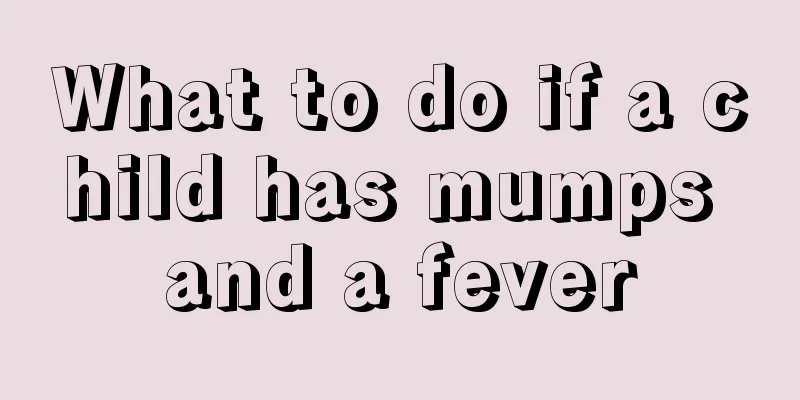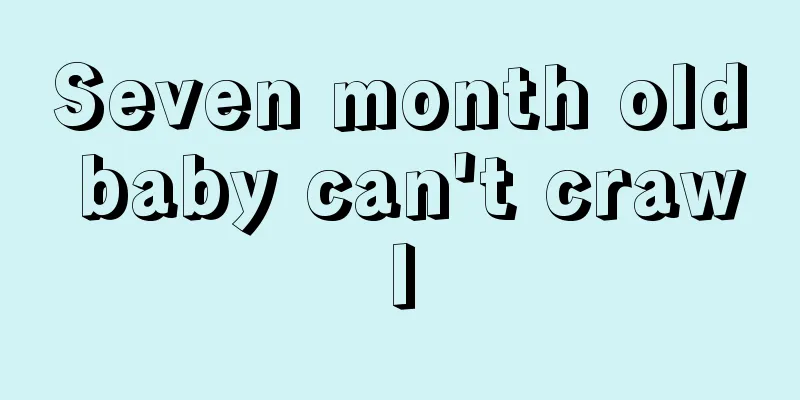The child is vomiting a lot, what's going on?

|
It is very common for children to vomit. For example, very young babies are prone to spitting up milk. There are many reasons for this. For example, many young mothers do not know how to breastfeed correctly, which causes the baby to spit up milk. In addition, this vomiting may also be caused by eating the wrong food, indigestion, or other diseases. 1. Feeding Problems In the first few months of your baby's life, vomiting is most likely due to a less serious feeding problem, such as overfeeding, indigestion, or an allergy to protein in breast milk or formula. To determine whether your baby is vomiting or spitting up (which is also common), just remember that when a baby spits up, only a few spoonfuls of milk will flow down his chin, while when a baby vomits, much more liquid will be spitted out. At the same time, the baby may be frightened by his own vomiting and may cry. Solution: Burp your baby more often after feeding and feed smaller amounts each time. In addition, do not let your baby move vigorously within half an hour after eating, and help him keep his body upright to aid digestion. You can hold your baby in an upright position, or if you have an infant car seat or a backpack at home, you can also put your baby in it. 2. Gastroesophageal Reflux If your baby is otherwise healthy but vomits soon after eating or for no apparent reason, gastroesophageal reflux is most likely to be the cause. Gastroesophageal reflux occurs when the muscles between the baby's esophagus and stomach do not function properly, causing food in the stomach to flow back up into the throat. Although your baby won't talk about it, he may feel abdominal discomfort or a burning or discomfort in the throat or chest. This problem will most likely disappear automatically by the time the baby is one year old, because the muscles in the baby's gastroesophageal area will have developed stronger and more powerful by then. Solution: For very young babies, you can try to keep them in a semi-upright position for 30 minutes after feeding. You can hold your baby upright, in an infant car seat, or in a backpack. If you have a baby car seat at home, your baby can also sleep in it in a semi-reclining position. But remember: keeping your baby completely upright can put pressure on his stomach and cause him to vomit again. Also, do not bounce your baby on your lap immediately after eating, or let your baby be too active. 3. Gastrointestinal Pathogens When babies are a few months old, gastrointestinal germs are the most likely cause of vomiting, especially if the baby goes to a daycare center during the day or if older children around bring new germs to your home. You must insist that everyone in your family wash their hands thoroughly after using the toilet or changing your baby's diaper to prevent the spread of germs. At the same time, try to ensure your baby's hands are clean. When babies are infected with gastrointestinal bacteria, in addition to vomiting, they may also experience symptoms such as diarrhea, loss of appetite and fever. Solution: When babies vomit a lot, they lose vital water, so you must replenish fluids for your baby in time to prevent dehydration, which can cause serious problems for babies. Here are some guidelines from the American Academy of Pediatrics (AAP) to help prevent your baby from becoming dehydrated: 4. Cold or other respiratory infections Respiratory infections may also cause vomiting because babies can easily become nauseated by a blocked nose. Solution: You should use a nasal aspirator to clear your baby's nasal mucus and try not to allow mucus to accumulate in your baby's nasal cavity. You can also ask your doctor if you can use nasal congestion medication to reduce your baby's mucus. 5. Accidental ingestion of toxic substances Your baby may also vomit because he or she has swallowed certain medicines, poisonous plants, herbs, or chemicals. Solution: If you suspect your baby has accidentally ingested a toxic substance, you should take your baby to the hospital immediately. Remember to bring the suspicious food or medicine and the medicine bottle, and inform the doctor so that the doctor can determine the nature of the poison in time and give the baby the correct treatment. 6. Infection or severe illness Occasional vomiting may indicate an infection in your baby's respiratory system, urinary tract, or ears. In rare cases, vomiting may even indicate pneumonia, meningitis, or Reye's syndrome. If your baby looks very ill or has other symptoms, your baby's vomiting may be a sign of a serious illness. Solution: Take your baby to see a doctor immediately. |
<<: What happens if a child has a lump in his breast?
>>: What are the methods for treating tracheitis in children?
Recommend
What are the symptoms of zinc deficiency in babies?
The reason why each disease is different is that ...
Where should I scrape the child when he has a fever?
Children’s health is an important topic that ever...
Child coughs and wheezing in the lungs
Children's lungs are very fragile when they a...
What causes red spots on babies?
What causes red spots on babies' bodies? For ...
What are the symptoms of chronic pharyngitis in babies?
When we suffer from pharyngitis, our throat will ...
Four-month-old baby's brain development
For four-month-old babies, they have just started...
How to whiten children's dark skin
Children are a carefree group, but there are some...
What can children eat to supplement iron deficiency quickly?
If a child is iron deficient, the harm is relativ...
Causes of premature heartbeats in infants
When a baby is born, it is the treasure of the fa...
What to do if your child's skin is always itchy
Children's physical conditions are rather spe...
What to do if your child's penis is itchy
Since many of the baby's organs are not fully...
What should I do if my child has a bump on the back of his head?
Children love to play, and sometimes it is common...
What are the symptoms of rabies in children?
I believe everyone is familiar with the disease o...
Methods for reducing fever in children
Children are in a period of rapid growth and deve...
What to do if your child is too lazy?
With the continuous improvement of living standar...









